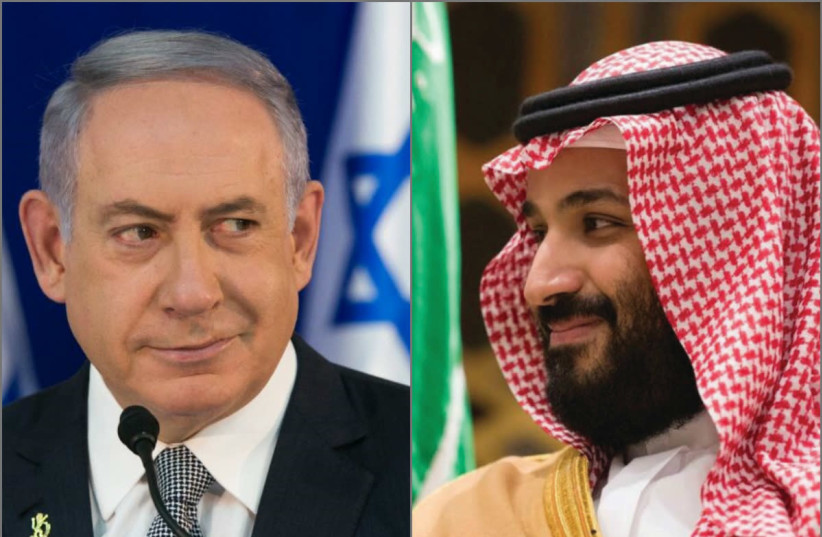If weeks of media buzz are a harbinger of a significant diplomatic development, then an Israel-Saudi Arabia normalization pact should be just around the corner.
Why? Because for weeks, the press has been full of stories relating to this possibility, and where there is buzz, there is often substance.
One day the story is about the demands the Saudis are making of the US to agree to normalize ties with Israel; the next day about US National Security Council head Jake Sullivan saying an Israeli-Saudi deal would serve US national interests.
One day there is a report that Prime Minister Benjamin Netanyahu spoke recently with Saudi Crown Prince Mohammed bin Salman, and the next day that intensive efforts are underway to arrange direct flights from Israel to Saudia Arabia for Israeli Arabs to take part in the Hajj.
One day former Mossad head Yossi Cohen said he thinks that a deal is “absolutely possible,” and another day, a US congressman says he would oppose arms deals to Riyadh as part of such a deal.

In other words, something is brewing, though what it is exactly is unclear.
On Tuesday, National Security Adviser Tzahi Hanegbi said in an Army Radio interview that Israel is also in a fog regarding talks between Riyadh and Washington over the issue.
The Saudis have reportedly presented demands to the US of what they would expect from Washington in return for normalizing ties, including the sale of advanced weapons, security guarantees and help in developing its civil nuclear program. And all of that is independent of the demands they reportedly have made of Israel, including a settlement freeze and increased Muslim autonomy on the Temple Mount.
The report of Saudi demands on Washington first appeared in the Wall Street Journal on Thursday, March 9. On the very next day, The New York Times reported that the Chinese had brokered a rapprochement deal between Saudi Arabia and Iran, its long-time rival and regional nemesis.
This timeline – one day a report about a possible Saudi peace with Israel, the next day about a possible Saudi peace with Iran – left some scratching their heads, wondering what the Saudis were after and whether a Chinese-brokered rapprochement between Saudia Arabia and Iran pushed further away any normalization between Riyadh and Jerusalem.
In other words, which story to believe: Thursday’s or Friday’s?
The answer, it now seems, is that they both were true. The Thursday story let the world know that the Saudis were looking for “prizes” from the US in return for normalizing ties with Israel.
The Friday story let the US know that Riyadh had other options and that if Washington did not patch up its badly damaged relations with the Saudis, Saudi Arabia could go graze in different pastures.
“In the Saudi-Israel-US triangle, when the Saudis deal with the US, their demands are with the US, less with Israel,” Hanegbi said. “Israel has a dream of peace with the Arab and Islamic world, and we believe that if there will be a breakthrough with the Saudis – like they allowed others to do, the UAE and Bahrain – then it will change the face of the Middle East… and will be a historical development. But the Saudi requests, as they have been reported, are of the US, and so it is an American dilemma: what they are willing to pay in exchange.”
HANEGBI’S COUNTERPART, Sullivan, said at a public forum earlier this month that the US has the “interest and bandwidth to promote” normalization between Israel and Saudi Arabia. Ultimately, he added, “getting to full normalization is a declared national security interest of the United States; we have been clear about that.”
While Sullivan did not spell out why this was the case, Hanegbi shed some light on it when dismissing the notion that the US – as Channel 12 reported recently – would demand Israel shelve the judicial reform plan before pushing through forward normalization between Jerusalem and Riyadh.
“There is no connection between the two issues,” Hanegbi said. “The Americans are looking at the Saudi channel through American glasses; they are looking after American interests.”
According to Hanegbi, if the Americans “believe an agreement with Saudi Arabia strengthens their position in the Middle East, pushes China and Russia out to a degree, and strengthens the trust of their regional allies in the president,” then they are not going to deprive themselves of those benefits over the issue of who is on the committee to select Israel’s Supreme Court.
One of the biggest challenges to getting the US to agree to ante up what the Saudis are demanding will be securing Congressional approval for extensive arms deals to a country with a horrendous human rights record and which US President Joe Biden said during the 2020 election campaign should be treated like the “pariah that they are.”
While US arms sales to Saudia Arabia is an internal US issue that will have to be worked out between Washington and Riyadh, Hanegbi said that it has ramifications for Israel.
“The Saudis have always said that if ‘we get close to Israel, we will be in danger from Iran, and if we are in danger from Iran, we want to be armed to the teeth,’” Hanegbi said.
The question, he added, is what will this do to Israel’s Qualitative Military Edge, a commitment made by successive US administrations and enshrined in law that mandates that the US needs to ensure that Israel has a qualitative weaponry advantage over any possible enemy in the region.
This is an issue that the US and Israel will have to discuss, Hanegbi said, but one that will only be relevant when there is a breakthrough in US-Saudi ties, something that has not yet transpired… despite all the buzz.
